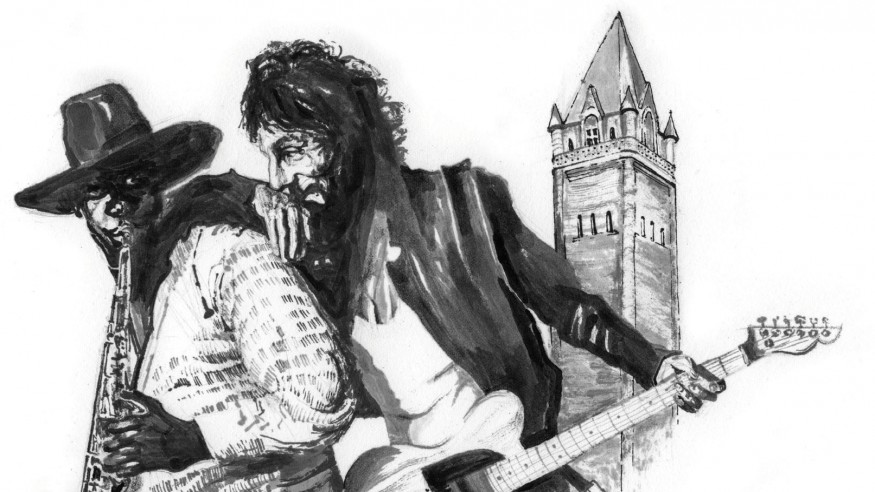
The Music of Our OWU Times
When I arrived at Ohio Wesleyan, I absorbed as much literature, history, science, languages, mythology, philosophy, and the arts as possible. Even music. In a recent Huffington Post article, I recollected how Bruce Springsteen’s “Born to Run” album, especially “Jungleland,” changed my relationship with my distant grandmother. I also recalled how my classical music-fixated mother established a formula that required me to listen to two classical music selections for every rock song I heard—down to the minute. Most of the time, it was just easier not to listen to music, rather than do all the math.
By the time I got to OWU, I was like a palimpsest, ready to write a new chapter over the old ones and punctuated by the music of my own era.
Music has been part of the human experience since the dawn of time. Archaeologists have discovered primitive bone and ivory flutes from 43,000-year-old Neanderthal graves and even musical notations on a 4,000-year-old Sumerian clay tablet. Apollo and the Muses—from whom the word derives—glorified music during the classical world. Music is found in every country. It binds us to each other and gives us context no matter what our differences.
While I came late to the party, I lost no time catching up. Music became one of my primary ways of communicating. I was not particularly adept at expressing myself verbally (I’m still not), and song lyrics helped me express my feelings. Gordon Lightfoot’s old standby “If You Could Read My Mind” actually got me through a nasty breakup. It may have been the coward’s way out, but I didn’t have the option of texting a breakup or even doing it via voicemail. In fact, Cheap Trick’s “I Want You to Want Me” still resonates as one of my favorite ways to express myself.
On a less cringe-worthy note, whenever I hear Pink Floyd’s “Money” track from “The Dark Side of the Moon”, I vividly recall how during my first year, my roommate and I were hanging out in our room in Stuyvesant with our boyfriends listening to the album. We were all just talking and eating brownies when we discovered we’d all been involved in productions of “Oklahoma!” in high school. Just hearing the sound of the cash register in “Money” summons an image of the four of us sitting on my top bunk, legs dangling, and belting out “O-k-l-a-h-o-m-a” as neighbors stood in our doorway and looked at us as if we were crazy.
Even now, when I hear certain songs…I want to go through the looking glass and return to those halcyon days at OWU.
Once during finals, one of the fraternity houses put speakers in their windows and blasted “Layla” from Derrick and the Dominoes loud enough to be heard all the way to Gray Chapel. I recall dropping books, standing close to my boyfriend, and slowly swaying to Nicky Hopkins’ piano solo. It was a magical moment that lives in me always.
I even grew to appreciate all those hours of classical music and opera. In one of my humanities classes, we studied Wagner’s Ring der Nebelungen. One evening at our professor’s house, we discussed how the leitmotifs (recurring themes in the piece) gave the characters more depth and connected them within the entire cycle. I wasn’t shy about contributing my own analysis of the musical connections throughout the cycle.
As Shakespeare wrote, “If music be the food of love, play on/Give me excess of it.” Other days and nights provide that excess in my memories. Whether it was arguing the nuances of guitar solos, or if music from previous decades was better than what we were hearing, music became the foundation of so many vibrant experiences. Even now, when I hear certain songs by Bruce Springsteen, David Bowie, Jethro Tull, The Moody Blues, The Clash, or The Eagles, I want to go through the looking glass and return to those halcyon days at OWU where I was young, and music surrounded and defined me.
Based in Cleveland Heights, Paula co-owns Scribes Unlimited, LLC. She has published eight books, seven of them nonfiction, and is currently writing a book series and short stories as “Paola K. Amaras.” She contributes to The Huffington Post at www.huffingtonpost.com/paola-k-amaras/.
